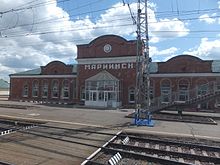Mariinsk
| city
Mariinsk
Мариинск
|
||||||||||||||||||||||||||||||||||||||
|
||||||||||||||||||||||||||||||||||||||
|
||||||||||||||||||||||||||||||||||||||
| List of cities in Russia | ||||||||||||||||||||||||||||||||||||||
Mariinsk ( Russian Мариинск ) is a city in the central Siberian Oblast Kemerovo ( Russia ) with 40,526 inhabitants (as of October 14, 2010).
geography
The city is located in the plain north of the Kuznetsk Alatau , about 140 kilometers northeast (as the crow flies) of the Oblast capital Kemerovo , on the left Chulym tributary Kija .
Mariinsk is the administrative center of the Mariinsk Raion of the same name .
history
In 1698, instead of an originally Selkup settlement, the second oldest Russian town in the region (after Kuznetsk ) was the village of Kijskoje ( Кийское ), named after the river . In the 18th century the Moscow wing ran through the village.
In 1856, Kijskoje was elevated to the status of a city as the administrative center of an okrug of Tomsk Governorate . In 1857 the city was given its current name in honor of Tsarina Marija Alexandrovna - wife of Alexander II and née Marie von Hessen-Darmstadt .
With the construction of the Trans-Siberian Railway through the town at the end of the 19th century, its importance and population continued to grow.
From 1929 to 1960 the Siblag prison camp ( Sibirski ITL , Siberian Camp ) existed in the Gulag system , the administration of which was in Mariinsk for the longest period (temporarily in Novosibirsk ). For example, the astronomer Yevgeny Perepelkin (* 1906, also Perepelkin ) was imprisoned here, after whom the lunar crater Perepelkin is named, and who was shot in Mariinsk on January 13, 1938.
Population development
| year | Residents |
|---|---|
| 1858 | 3,671 |
| 1897 | 8,216 |
| 1939 | 22,278 |
| 1959 | 40,793 |
| 1970 | 39,699 |
| 1979 | 39.504 |
| 1989 | 40,956 |
| 2002 | 42,977 |
| 2010 | 41,526 |
Note : from 1897 census data
Culture and sights
In Mariinsk there is a local history museum with an attached memorial museum for the Soviet writer Vladimir Chivilichin (1924–1981), who was born in Mariinsk and who wrote a number of works mainly dealing in Siberia.
Economy and Infrastructure
In the city there are wood processing, light and food industries.
Mariinsk is an important station on the Trans-Siberian Railway (3713 km from Moscow ). It is the westernmost station of the Krasnoyarsk Regional Railway Directorate . The further route towards Novosibirsk belongs to the West Siberian Railway . In addition, the traction current system in Mariinsk is changing from 3000 V direct current of the West Siberian to 25 kV 50 Hz alternating current of the Krasnoyarsk Railway, so that the locomotives are changed here on all trains.
The R255 trunk road , which is part of the transcontinental road connection from Novosibirsk to Irkutsk and from which the regional road R400 to Tomsk branches off , also runs through Mariinsk .
Individual evidence
- ↑ a b Itogi Vserossijskoj perepisi naselenija 2010 goda. Tom 1. Čislennostʹ i razmeščenie naselenija (Results of the All-Russian Census 2010. Volume 1. Number and distribution of the population). Tables 5 , pp. 12-209; 11 , pp. 312–979 (download from the website of the Federal Service for State Statistics of the Russian Federation)
- ^ Siblag in the GULAG website of Memorial Deutschland e. V.
- ↑ Communication of the KGB of the USSR on the fate of Pulkovo astronomers from February 10, 1989 (Russian)
Web links
- Mariinsk on mojgorod.ru (Russian)



